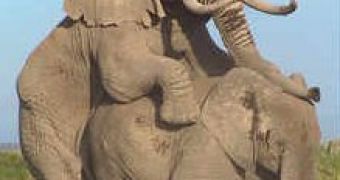Faster mating means safer existence.
This is valid at least in the case of the large herbivorous mammals, from rhinos and elephants to deer and antelopes: the slower their reproductive period, the higher the risk of extinction.
Habitat loss and naturally limited living areas are also great factors of risk, but under the hunting pressure, speedy reproduction is the best tool, as found by a new complex statistical analysis made by evolutionary biologist Samantha Price, a postdoctoral fellow at the National Evolutionary Synthesis Center in Durham.
This explains how the American bison was nearly led to extinction in just a few years of massive hunting pressure with almost no habitat change while the white-tailed deer is still thriving and increasing in number even under hunting pressure and suburban growth. "The bison nurses its young for 283 days on average; the deer just 80," Price notes.
Price investigated 144 species of hoofed mammals, like pigs, llamas, cattle, sheep, goats and antelopes, including threatened species, combining data on hunting, land use and the species' reproductive rates. After hunting, habitat loss is the most important factor. But no matter the factor of extinction, they are "all human-caused at some level," Price said. "The worst-case scenario is where humans are expanding into an area and changing its habitat, and hunting the indigenous animals as they go", she said.
Currently, the hot spots of the species' extinction due to hunting are West Africa, Indonesia and Malaysia, and South America. "The poorer the country, the greater the threat," Price said. Regional military conflicts also rise the pressure on wild species, hungry people turning to "bush meat" for protein, the largest part of which is made of hoofed animals. "Because these are large, plant-eating animals, they have a significant effect on the local ecology," Price said.
The vegetarian mammals spread the plant seeds through their dung and control plant growth. "You can completely change the ecosystem without knowing it if you hunt these animals to extinction," she said.

 14 DAY TRIAL //
14 DAY TRIAL //